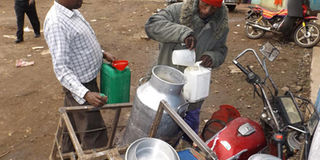Watch out, risk of buying polluted milk has doubled

Dairy farmer, James Mwangi sells milk at Sh55 per litre in Ol-Kalou, Nyandarua. Some unscrupulous traders however buy the commodity from farmers, contaminate it then sell. PHOTO | JOHN GITHINJI | NATION MEDIA GROUP
What you need to know:
- The farmers, a majority who have contracts with various cooperatives, are torn between selling their milk to the societies at lower prices and hawking it to consumers to cash in on higher prices.
- The cost of fodder, molasses and even water has gone up but milk prices are low. As a farmer, I have to find a way to survive.
- Unscrupulous farmers and traders are polluting milk by adding several contaminants, including water, margarine, starch, wheat flour, chemical preservatives like hydrogen peroxide and formalin to increase the amount of produce.
- In the markets, consumers have no gadgets to check quality of milk sold, which worsens the situation.
As the dry spell ravages different parts of the country, increasing the cost of producing milk, many dairy farmers are at a crossroads as they seek to reap from their produce.
The farmers, a majority who have contracts with various cooperatives, are torn between selling their milk to the societies at lower prices and hawking it to consumers to cash in on higher prices.
Some cooperatives have revised their buying rates downwards to a low of Sh29 a litre worsening the plight of farmers while others have raised to Sh35, but these prices are lower compared to those in the open market, at Sh60.
The result is that farmers are not delivering milk as expected to the societies.
Francis Wachira, the manager at Kirima Dairy Co-operative in Kirinyaga County, says supply from farmers has gone down drastically after they revised milk rates downwards on December 1, last year to Sh29 from Sh31.
They are now receiving 7,200 litres a day down from 8,300 litres or more. Geoffrey Imathiu, the chairman of Nari Co-operative Society in Meru, says they have registered a slight drop in milk supply from 104,048 litres in November to 99,928 in December and it is still falling.
“The cost of fodder, molasses and even water has gone up but milk prices are low. As a farmer, I have to find a way to survive,” said James Mugambi, a farmer in Meru. Most farmers, according to Mugambi, are selling the milk they get in the morning to cooperatives while evening, to traders at Sh50 or directly to consumers at Sh60.
However, as farmers seek better market, the risk of consumers buying contaminated milk has doubled.
ADDING CONTAMINANTS
Unscrupulous farmers and traders are polluting milk by adding several contaminants, including water, margarine, starch, wheat flour, chemical preservatives like hydrogen peroxide and formalin to increase the amount of produce.
Other farmers are selling milk from sick cows or those on treatment, which contains antibiotics elements that are hazardous to human life.
Teresiah Ndung’u, milk quality tracking and tracing project manager at Happy Cow Ltd in Nakuru, states that antibiotic residues in milk contribute to the risk of allergic reactions and development of resistant pathogens.
“With the radicles released by contaminants like hydrogen-peroxide, having health effects such as DNA mutations that lead to cancer is a real possibility. High bacteria counts produce heat resistant enzymes, which can be passed to the final dairy products.”
Mary Ng’ang’a, a quality trainer with Policy and Market, observes that with contaminated milk, many citizens are taking in antibiotic treatment that they don’t need.
“So when they will become sick, and get treated with antibiotics, they may not get better.”
Whereas adulterated milk is rejected at the co-operatives with a heavy penalty and to some extent an expulsion of the said culprit, many consumers cannot differentiate adulterated from safe milk.
NO GADGETS TO CHECK MILK QUALITY
In the markets, consumers have no gadgets to check quality of milk sold, which worsens the situation.
At Nari Co-operative, Imathiu says if a farmer supplies contaminated milk for the first time, half of the monthly wage isn’t paid, and if caught for the second time, the entire monthly wage isn’t paid and if caught for the third time, the farmer is expelled from the co-operative.
At Uruku Dairy Farmers Society, David Mwenda Mukindia, the chairman explains that a farmer caught adulterating milk for the first time is fined Sh5,000.
And on the second count, the farmer forfeits the entire month’s pay and gets a warning letter and he is summoned before the board.
“When caught the third time, one is expelled and members informed at the annual general meeting,” says Mukindia, advising consumers to buy milk from trusted sources.
Christine Wanja, a resident of Chuka, says she recently bought milk that had a pungent smell and when she decanted after about 30 minutes, she found a white substance at the bottom of the jar.
Sadly, she had no recourse. Her only saving grace was that she discovered the anomaly before using the milk for tea.





